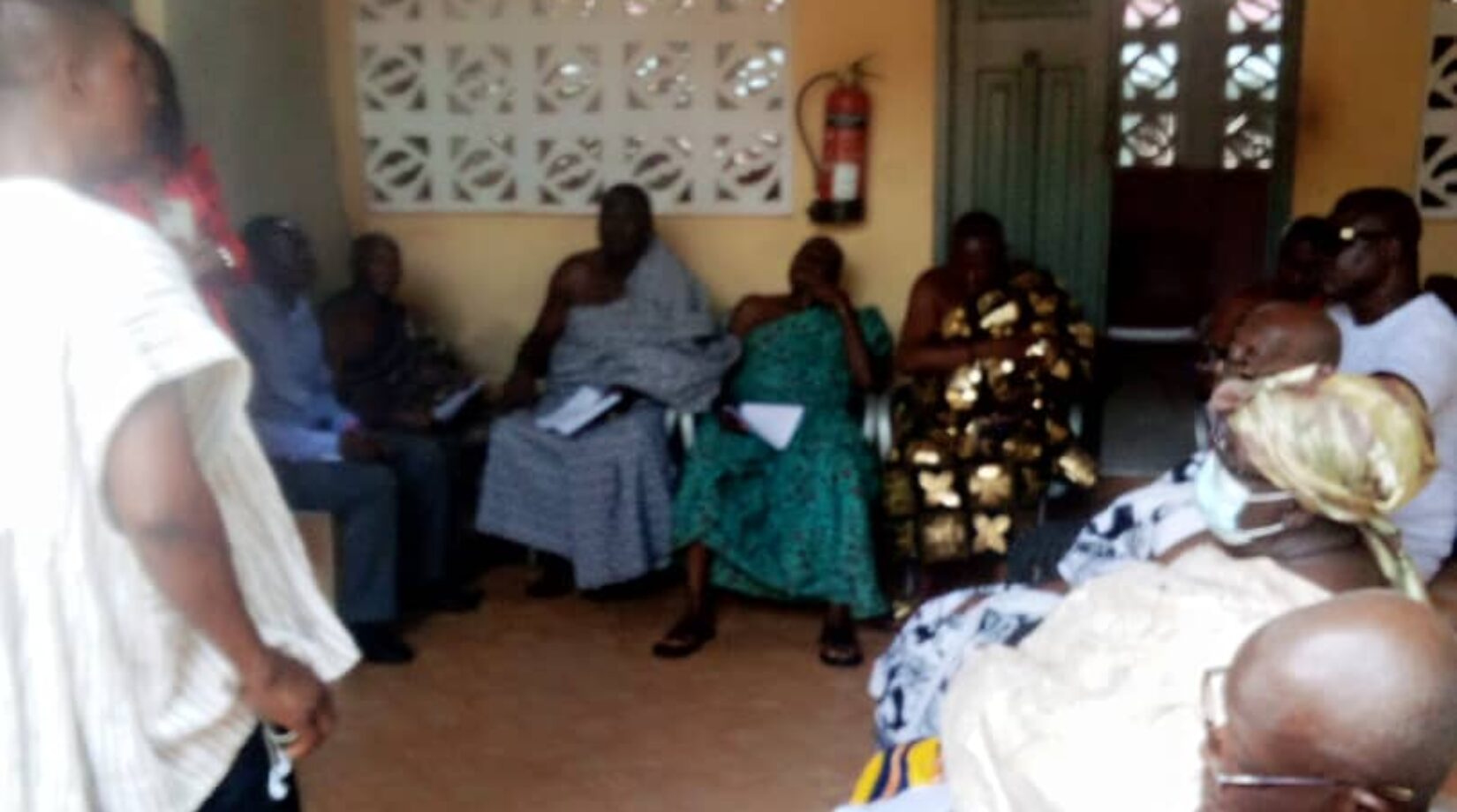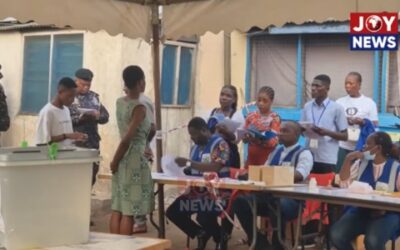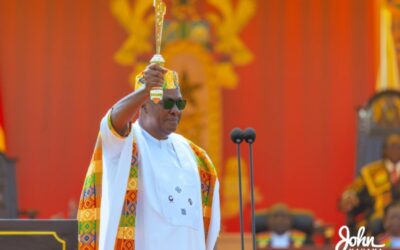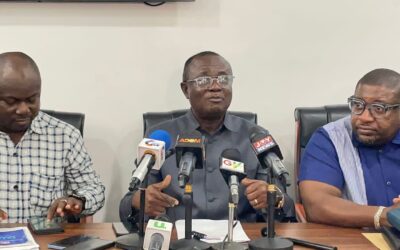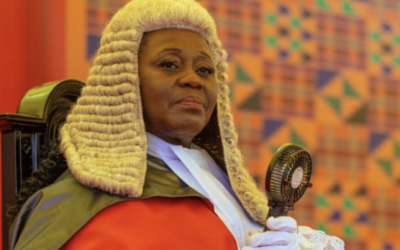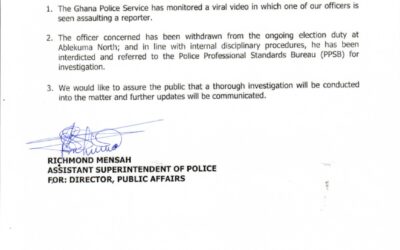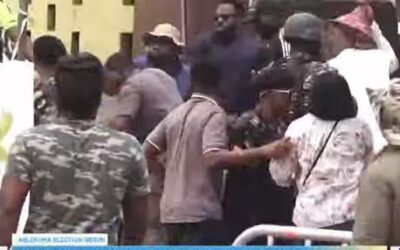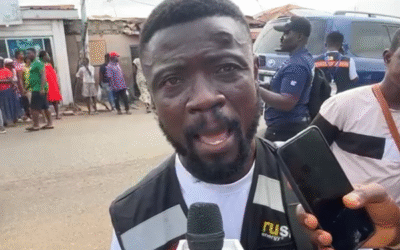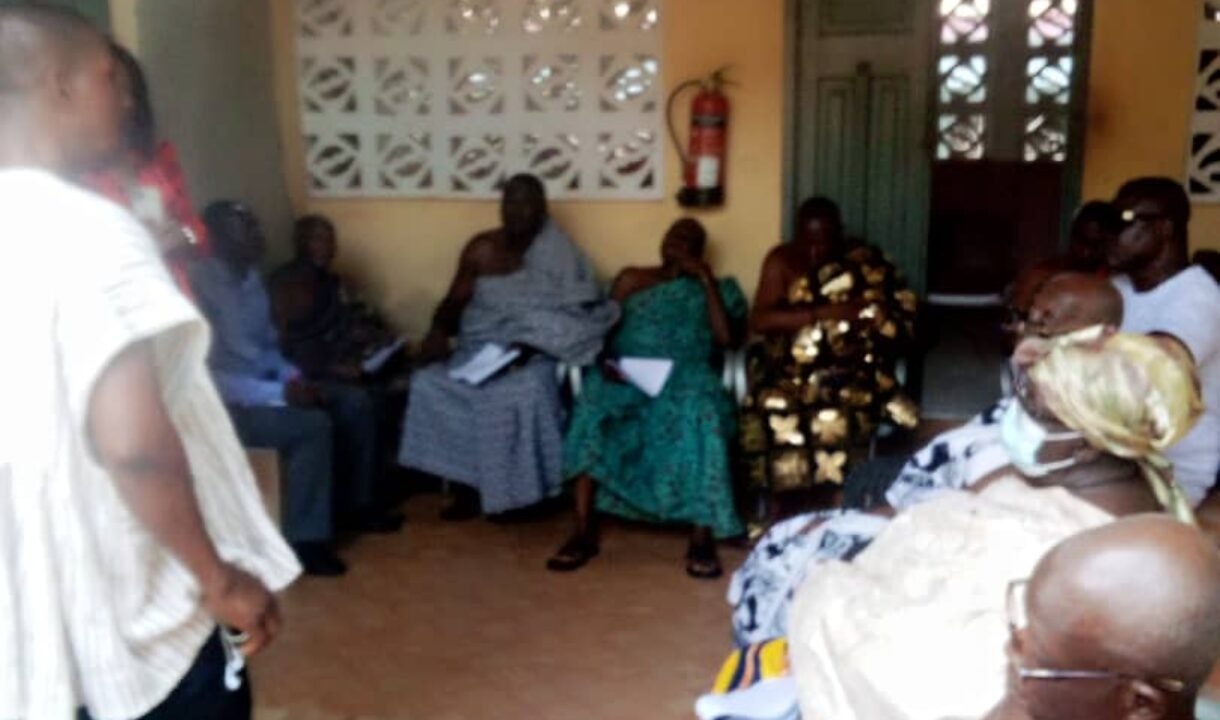By: A news desk report
A-Day Orientation Workshop on Ghana’s Mining Laws has been organized for the Traditional Leaders in Duayaw-Nkwanta in the Ahafo Region of Ghana. The workshop was chaired by the Paramount Chief of Duayaw-Nkwanta Nana Boakye Tromo III.
Speaking at the worshop, Mr. Richard Adjei-Poku (Executive Director) of Livelihood & Environment Ghana – LEG and resource person for the workshop took participants through Article 126 (1962), PNDC Law 153, Article 257 (6) of the 1992 Constitution and Section 1 of the Minerals and Mining Act (Act 703, 2006). Mr. Adjei-Poku said in terms of ownership of Ghana’s minerals, all the articles mentioned above place the Republic of Ghana as owner but vested in the President on behalf of, and in trust for the people of Ghana.


Mr. Richard Adjei-Poku ,Executive Director of Livelihood & Environment Ghana – LEG addressing the traditional leaders
The workshop revealed the president, mineral right holder (mining company) and the mining affected communities as the three major stakeholders when it comes to mining operations in Ghana. And that each of the three stakeholders has some basic rights and responsibilities provided in for by the various mining regulations.
The resource person noted that, the president have the power for compulsory acquisition of land and property, Article 20 (2) of the Constitution and section 2 of the Minerals and Mining Act, Act 703, 2006.
He further disclosed that, the president have the power to grant mineral license, revoke, suspend, terminate or punish mineral rights holder offenders (sections 5, 68, 69, 87, 99, Act 703, 2006).
The resource person outlined the powers of the mining right holders (companies) which include power of entry, power for reconnaissance, prospecting, exploration and mining. He also mentioned mining companies power to obtain, divert, impound, convey rivers, streams and underground reservoir and power to export, dispose or sell minerals ( sections 9 (1), 13 (9), 17 and 6 (1) of the Act 703, 2006.
The resource person also elaborated the powers and rights of the mining affected communities. The constitution and the mining law acknowledge the mining affected communities as lawful occupiers and have surface right over the land. And those powers and rights can only be taken by a prompt payment of fair and adequate compensation, he emphasized (Article 20 (2a), section 73(1) and section 74 (1 a up to 1 g) of Act 703, 2006).
He said the sector minister and Newmont own the people particular the Chiefs (allodial owners) right to information about the development of bthe mine even before the commercement of the mining operation (section 13 (1,2, 3a,).
Nananom were disppointed about the failure of Newmont and as ewl as the sector minister to share information regarding the Ahafo North operation as stipulated in the Act.
Mr. Adjei-Poku disclosed the communities access to compensation payment within three months after an amount of compesation has been determined and further access to ten percent interest on the amonunt for each month that the compensation remains unpaid by the company (Section 4 (1 and 2 of CRR, 2012).
On the issue of resettlement, the resource person revealed that the displaced inhabitants are supposed to be resettled in suitable alternative land with due regards to their economic well-being, social and cultural values (Article 20 (3) of the constitution, section73(4) of Act 703, 2006 and section 6 (1) of the L.I. 2175 CRR, 2012. Again, he disclosed that the mining lease holder has the responsibility to engage prior consultation with the relevant District Assembly, Chiefs and the inhabitants to be displaced on resettlement planing and implementation (section7 (a) of the L.I 2175, CRR, 2006).
Mr. Adjei-Poku in conclusion hinted participants the responsibility of the mineral right holder to resprect human rigts and to comply with all regulations in the Act 703, 2006 and other enactments for the protection of the environment (section 18 (2) Act 703, 2006).
Mrs. Felicity Ashon a spokes person for Afrisipa community women farmers thanked the traditional leaders for availing themselves for the training and used the opporttunity to expressed her sincere gratitude to Global Greengrants Fund (GGF) for supporting the advocacy work of the Afrisipa community and women farmers in particular. He pleaded with the chiefs to support the course of the property owners and for that matter women farmers to get better compensation package from Newmont in order to achieve SDGs 1, 2, 3 and 13 which aim at endding povert, zero hunger, quality education and sustainable life for all.

